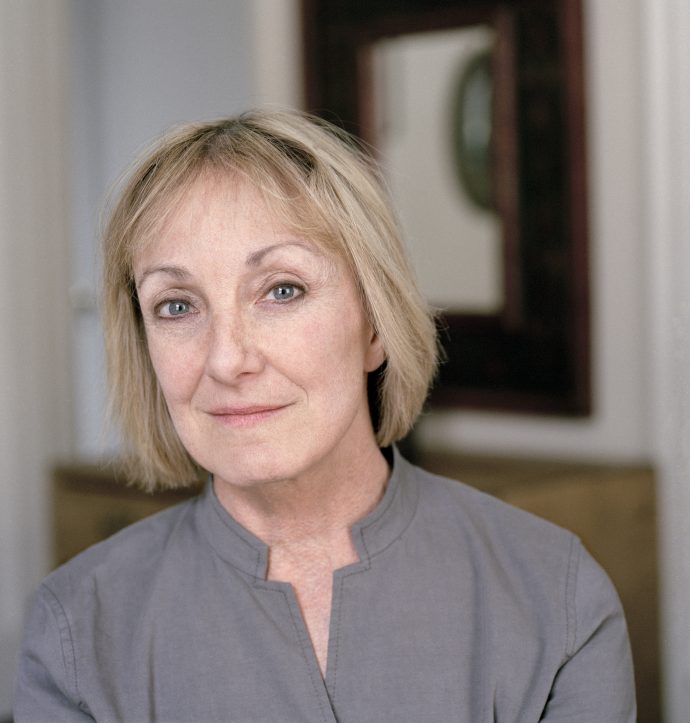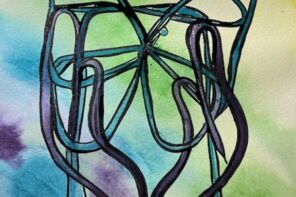Christine Schutt is the author of three novels: Florida, a finalist for the National Book Award; All Souls, a finalist for the Pulitzer Prize; and Prosperous Friends. Her stories are collected in Nightwork and A Day, a Night, Another Day, Summer. Now retired, she taught secondary school for many years and is the consulting editor of NOON Annual. She has another collection of stories, Pure Hollywood, forthcoming in spring of 2018. In all her novels and stories, she lays bare, in musical and precise prose, the messiest parts of human life: ill-fitting intimacies, bad desires, fetid loneliness, physical and mental illness, and the desperate, scrabbling need for love and home—all that is most complex and contradictory in her characters.
Christine and I met on a warm afternoon and sat on the rooftop patio of the Moonrise Hotel in St. Louis beneath a huge, spinning fake moon, where we discussed how her writing has changed over the years, her early love of Virginia Woolf’s biography, and her dream of writing a happy novel.
Christina Wood Martinez: Whenever I read your work, I feel that place and how characters navigate their environments is very important to the conflicts found in your plots. In Florida, Alice, orphaned, is shuffled off to live in her relatives’ many different houses in the Northern Midwest and Tucson. Later, she is split between California and New York. And of course there is Florida itself, which is both a literal and a figurative place to escape to. In All Souls, the school the novel is set in feels to be just as much a character as the people in it. And in Prosperous Friends, we follow a young couple through a few years wherein they’re near-nomadic. Can you talk about how place figures as a conscious or unconscious effort as you’re writing a book?
Christine Schutt: Yes, place is important. I used to base my choices on wherever it was I really wanted to be. If I was in a cold climate, I might write about the desert, for example. But that doesn’t seem to be as true any more—it’s just that something catches my fancy. There are some landscapes that I think are really powerful. I love the desert—I love it. I can’t say I know it well, but I’ve had some very potent experiences in different spots in Los Angeles. I’ve set one story there. I also really love looking at real estate. So, with Prosperous Friends, I know I spent a lot of happy time looking at different lofts in Chelsea and elsewhere. That was just fun.
CWM: Your characters, too, do a lot of moving around to different places, often in a restless way.
CS: It’s funny, I think that just happens. In “Pure Hollywood,” if I think about it, it’s very much like Florida in the sense that one of the characters is looking for a place she can claim as hers and as home. I think that probably happens with writers. You have four or five—if you’re lucky, because it could be only one or two—themes or places you write about. You never think you’re writing the same story, but you are.
CWM: The last time you visited us here in St. Louis you talked a little bit about drawing from personal experience and from people you’ve known when creating fictional characters. I’m wondering if this is something that comes without reservation for you, or if it’s maybe something you have to set rules for subjects or people you can’t touch?
CS: I feel fine about taking something I remember and manipulating and changing it, because if I don’t change it, it’s not as much fun.
As far as things being off limits, I usually feel a lot of things have been manipulated enough that nobody’s going to recognize themselves, although they always say they do. Everybody does. After All Souls came out, I had several people say, “I know that’s me,” and I wanted to say “Actually it’s not,” or “It might be sort of, but it’s that person and that person, too” (laughing). So, people do find themselves there. But when I’m writing and taking from my own experience, I’m making memories larger and stranger because it’s just more interesting for me, and more interesting as a reading experience.
It’s funny the way some things come back—things you certainly never thought you would pick up for a story or a novel. But suddenly they surface again.
CWM: When I read your novels I’m also really struck by their structure. Florida, as an example, in some ways moves linearly and we see Alice and her mother age over two decades, but we’re also always circling back into and through memory. All Souls has such a proliferation of different voices and views, but also has centripetal force that holds all the pieces together.
I wonder if you could talk about how you go about structuring your books—do you have an idea when you begin, or do you find your way as you go along? Are there principles of tension and movement you like to follow?
CS: When I started Florida, I’d been teaching Jane Eyre for a million years, and I finally realized that Jane Eyre was an orphan’s novel—I’m a very slow learner [laughing]—and that all orphans are simply looking for a home. I had talked for years about the way that Jane Eyre is made, which is so simple, of different houses that Jane keeps moving outward from. The very first line of that novel is, “There was no possibility of taking a walk that day,” which is immediately reversed and all Jane is going to do throughout the novel is walk from one house to another to another. Once I realized that, I thought, “That’s a relief,” and it enabled me to do what I wanted to do with Florida. I had that structure in mind, but Alice’s age and the novel’s breakdown and subtitles—that took time to figure out. Originally every chapter had a new title, but that was too diffuse.
With All Souls, it was wonderful in the sense that I knew I was going to do a school year, so that already gave me structure. And then I knew I was going to take the major events that happened in the school year as chapters. I knew that there would be someone who was sick, because when that happens in these smaller schools everybody responds to it and uses one person’s tragedy in one way or another. I knew the book would be about that, and I also knew that Astra Dell wasn’t going to die because I wasn’t really interested in that. I was interested in that more perverse idea that it might have been better had she died—it would have been more dramatic, or something like that. I also knew the sets of characters. Originally it was a smaller cast, but you just can’t stay with some people for that long—they’re just not that interesting. I love the feckless girls, for example, the girls who are naughty—they’re so fun—but you really wouldn’t want to stay with them forever.
CWM: You must have taught some feckless girls over the years, too.
CS: I did! And loved them.
All Souls was really the easiest book to write, because it was right out of my life and I’d been thinking all the time I’d been teaching that someday I really wanted to write a school book. The school as a character, the school as a family, because that’s certainly how I experienced it myself.
CWM: In another interview you mentioned that you read a lot of author biographies when you were in your late teens. I wonder whose biographies you read? What did you get from them then and are you still drawn to them?
CS: I think the one that had the biggest impact was Virginia Woolf’s biography by Quentin Bell. This I read in my early twenties. I was looking for ways to live. How do people do this? Knowing Woolf’s anxieties, that was comfort. And there were certain scenes that I found very powerful. When she and her sister are bathing as children, for example, and Virginia tells her older sister, Vanessa, that she was going to be a painter and that she, Virginia, was going to be a writer. Robert Lowell did the same thing—he told his friends, you’re going to be that, I’m going to be this.
I have a memory—I remember this happened, but I’m equally sure I made it up—I was on a train from Milwaukee to Chicago with my mother and it was my birthday, and my best friend was along. My mother would often go to people who did tarot cards or read palms or horoscopes and later in her life she went to a lot of séances. So, she believed in a lot of this. But there was somebody on the train who apparently did a reading for her and knew things about my mother that had astonished her. In my memory, my friend and I were both given a kind of mini-reading. I knew then what I wanted to be. I wanted to be an actress. I had no other occupation in mind. And I was told I was going to be a writer, I remember thinking it was a “rider” on horseback (laughing). I did like horses. But my mother explained it to me—no, no, it wasn’t a rider, it was a writer, and I just felt enormous disappointment [laughing]. And she told my friend she was going to be an actress.
But, reading biographies you see how other people came to their craft or suffered—I’ve always been very interested in where people write, how they write. Do they stand? Do they need a certain kind of pen? And I’ve read many biographies since then of Robert Lowell and certainly of Virginia Woolf. They had the biggest impact.
CWM: What kind of actress did you want to be—a Hollywood starlet?
CS: I loved the movies, I always loved the movies. And my mother did amateur theater and was on local television and gave readings. So I often would rehearse with her and things of that nature. But I didn’t want to be like my mother, of course, I didn’t want that. I loved movies and dancing and singing, but by the time I was twelve I realized I just couldn’t bear it—I didn’t want to be that at all. It was too painful, knowing that people are so critical.
CWM: When you write you get to inhabit characters and perform them, though, so that could still be satisfying that early urge.
CS: You do! Yes, yes.
CWM: The other night, you read an older story, “Metropolis,” from Nightwork and then a newer one, “The Duchess of Albany,” and there was such a tonal difference between the two. The stories from Nightwork are so dark and lush and strange, and then—you may have noticed—everyone was dying laughing at “The Duchess of Albany.” Generally speaking, I would say your writing has become more humorous you’ve gone along. Is humor something you intentionally invited into your work at a certain point?
CS: I’m always happy when people laugh, and I’m always surprised. I read that newer story, “The Duchess of Albany,” not long ago and people did laugh and that just surprised me. I can’t say I’m writing with that in mind, though.
Sometimes with a first book, as with Nightwork, it’s just all intense. But now my style is getting simpler and simpler. With what I’m working on now, I have this idea that I would like it as absolutely clean and fast as it can be—that’s my ambition, and it’s hard, but I’m enjoying it.
When I look back at the older work—and it is very different—I wanted to get as many words on the page as I could. I wanted to be as excessive as I could. And I also felt, certainly with Florida, a sense of wanting to pack it with every poet I’d ever loved, using books that came right of my high school experience, poets I encountered at the same age as Alice. Also, I thought I might never write another novel and I wanted to get it all in. Now I don’t feel quite that way any more—now it’s something else.
CWM: Is that a liberating change, then?
CS: No, I don’t think anything’s liberating [laughing]. I don’t.
I was here two years ago and I felt so sure and cocky—I really thought I knew what I was doing with “Pure Hollywood.” And I left and the next two years were hell [laughing]. Now I’m embarked on another novel and I’m feeling equally fully of myself, but I’m not going to say a damn thing about it—I’ll jinx it. I have to be more superstitious about it.
CWM: Is “Pure Hollywood” done then, since you’re now on to something else?
CS: I was never able to make a novel out of it. I could see myself having to work on it for years. And I did have these stories, like “The Duchess,” that I’d like to have out, though nobody likes stories and they don’t sell. So this past fall, I decided to whittle “Pure Hollywood” down into a very streamlined, fast story. So, it’ll be in a collection of stories. They’re all supposed to be out next April.
My new novel, I’m happy about so far. But that’s how you feel about it in the beginning.
CWM: Young love.
CS: Young love—right, exactly. Right now it’s dandy and I think I have it in hand and it’s going to be much, much easier than “Pure Hollywood,” because with “Pure Hollywood” I was just in the dark.
CWM: Is there a dream novel—maybe even an impossible-to-execute novel—that you’d someday like to write?
CS: Well, it would be nice to write a novel that would make people feel happy.
CWM: It’s hard to come across those.
CS: It is.
I love So Long See You Tomorrow by William Maxwell. I love the way it’s made. I love the way it’s in between memoir and novel. I love Sleepless Nights by Elizabeth Hardwick for the same reasons, although the Maxwell is far more complicated structurally.
It would be nice to write a novel that just verges on the sentimental, that isn’t sentimental, but that you can feel. When people don’t read fiction, I usually give them So Long See You Tomorrow, saying “You’ll get confused about the character’s names, everyone sounds alike at first.” As soon as you finish it, you forget all that, but you’ll never forget how you feel when you’re reading it, how touching it is, and how beautifully it pulls together. He has that wonderful scene where he goes with his stepmother’s brothers who take him to the city and who are so genuinely kind to him, giving him money. There’s a small description about how he really understands what it is to give to other people—the joy you feel. It’s so touching. I’d love to be able to be in some kind of a book where I could write with that kind of authority or elicit that feeling.
CWM: It’s hard to write about joyful things for some reason.
CS: It is, it is. And most people will say to you, “Why don’t you write about happy things?”
CWM: But it bugs me when people say they don’t read dark books because they make them feel bad. For me, I think if you’re reading about people’s difficulties you at least don’t feel so alone in your own. There’s joy and solace to find in dark books.
CS: Yes, I think it’s the most wonderful experience in the world. I mean, I like sentiment and comedy and all of that. And that’s very rare too—it’s hard to get people to really laugh out loud. But sad is wonderful. It’s very cathartic. It’s akin to going to the theater—you come out alive, you can be joyous again. You saw the worst, and yet you came out of it and you’re still breathing.
Christina Wood Martinez is Assistant Editor of Dorothy, a publishing project. Her fiction and interviews have appeared or are forthcoming in The Literary Review, Puerto del Sol, and The Rumpus.




